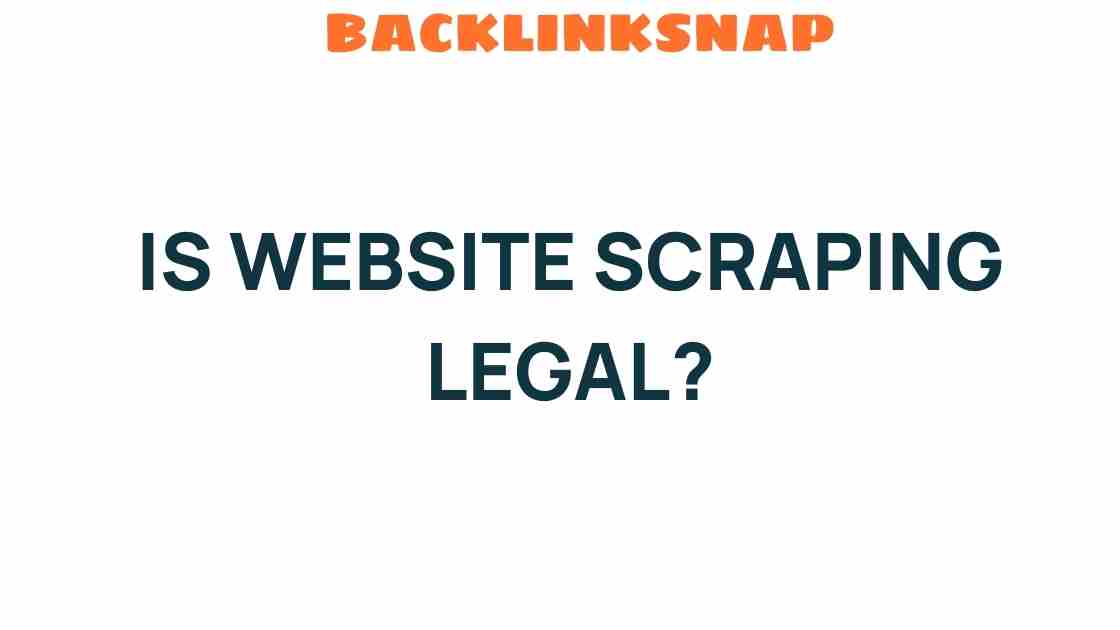Is Website Scraping Legal? Unpacking the Gray Areas of Data Extraction
In the digital era, the ability to access and utilize information is paramount for businesses, researchers, and developers alike. One method that has gained significant traction is website scraping, a technique used to extract data from websites. However, this practice exists within a complex legal landscape that raises questions about its legality, ethical implications, and compliance with copyright law and terms of service. This article aims to unpack these gray areas surrounding data extraction, offering insights and guidance for those navigating this intricate domain.
Understanding Website Scraping
Website scraping refers to the automated process of extracting information from websites. This can range from gathering product prices, collecting social media posts, to aggregating news articles. While the technical process can be achieved through various tools and programming languages, the legal implications of data extraction are less straightforward.
At its core, web scraping involves web crawling, where bots or scripts navigate the internet to gather data. While this process can be incredibly beneficial for legitimate purposes, such as research and competitive analysis, it can also tread into murky waters when it comes to legality and ethics.
Legal Implications of Website Scraping
When discussing the legality of website scraping, several factors come into play:
- Copyright Law: Copyright law protects original works from unauthorized use. If a website’s content is copyrighted, scraping that content without permission could lead to legal action.
- Terms of Service: Many websites have specific terms of service that explicitly prohibit scraping. Violating these terms can result in legal repercussions, including being banned from the site.
- Data Ownership: The question of who owns the data being scraped is critical. While the data may be publicly accessible, ownership rights can complicate matters.
For instance, a landmark case in this domain is hiQ Labs, Inc. v. LinkedIn Corp., where the court ruled that scraping publicly available data from LinkedIn does not constitute a violation of the Computer Fraud and Abuse Act (CFAA). This case highlights the complexities of data extraction and the interpretation of laws regarding access to public information.
Ethical Considerations in Data Extraction
Beyond legalities, ethical considerations play a critical role in the discussion surrounding website scraping. Engaging in ethical scraping practices is essential for maintaining a positive reputation and fostering trust within the digital ecosystem. Here are some key points to consider:
- Respect for Privacy: Always consider the privacy implications of scraping data. Avoid extracting personal information without consent.
- Impact on Website Performance: Excessive scraping can strain a website’s server, leading to performance issues. Implementing rate limits can mitigate this impact.
- Transparency and Fair Use: When possible, inform website owners about your scraping activities and ensure that your use of the data aligns with fair use principles.
In practice, ethical scraping not only helps avoid legal issues but also supports a healthy digital environment where data sharing is encouraged rather than stifled.
As digital rights continue to evolve, understanding the implications of data extraction is crucial for any entity engaged in scraping. Here are a few pointers to help navigate this landscape:
- Stay Informed: Laws regarding web scraping are constantly changing. Keeping up-to-date with recent court cases and regulations is vital.
- Consult Legal Experts: If you’re unsure about the legality of your scraping practices, consulting with a legal expert can provide clarity and direction.
- Leverage APIs: Whenever possible, use official APIs provided by websites for data extraction. This approach is often more compliant and reduces the risks associated with scraping.
Best Practices for Ethical Website Scraping
To ensure your website scraping efforts are both legal and ethical, consider implementing the following best practices:
- Read Terms of Service: Always review a website’s terms of service before scraping. Compliance is key to avoiding legal trouble.
- Limit Frequency: Schedule scraping at intervals that won’t overload the website’s server. This can help maintain a good relationship with site owners.
- Use Data Responsibly: Once data is collected, use it in a manner that respects the original context and intent of the data.
- Provide Attribution: If applicable, give credit to the original source of the data to maintain transparency and ethical standards.
Frequently Asked Questions
1. Is all website scraping illegal?
No, not all website scraping is illegal. Scraping publicly available data in compliance with terms of service and copyright law can be legal.
2. What are the risks of website scraping?
The risks include potential legal action from website owners, violation of copyright laws, and account bans for violating terms of service.
Scraping from social media sites is often against their terms of service. It’s essential to check each platform’s policies before proceeding.
4. What should I do if I receive a cease and desist letter?
Consult with a legal professional immediately to understand your options and respond appropriately to such a letter.
5. Are there any tools for ethical website scraping?
Yes, there are many tools available such as Scrapy, Beautiful Soup, and Octoparse that help facilitate ethical scraping practices.
6. How can I ensure compliance while scraping?
Regularly review the terms of service of the website, stay informed about relevant laws, and, when in doubt, consult legal counsel.
Conclusion
In conclusion, while website scraping presents numerous opportunities for data extraction, it also comes with significant legal and ethical considerations. Understanding the nuances of copyright law, terms of service, and ethical practices is crucial for anyone looking to engage in this activity responsibly. By adhering to best practices and staying informed about the evolving landscape of digital rights, individuals and organizations can navigate the complexities of website scraping while minimizing risks and fostering a positive digital environment.
For further insights on digital rights and ethical data practices, consider visiting the Electronic Frontier Foundation for valuable resources and guidance.
Additionally, if you’re looking for more information on web scraping technologies, check out this comprehensive guide.
This article is in the category Digital Marketing and created by BacklinkSnap Team




